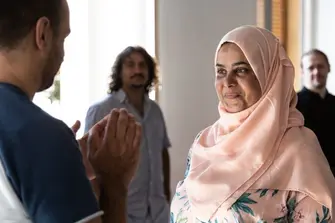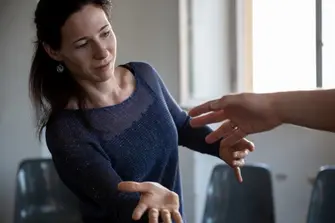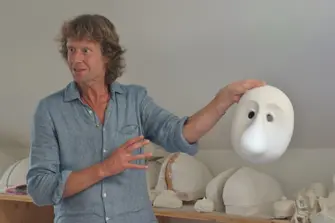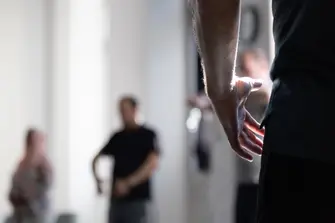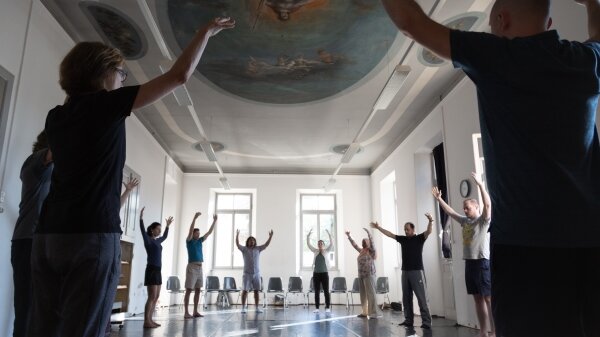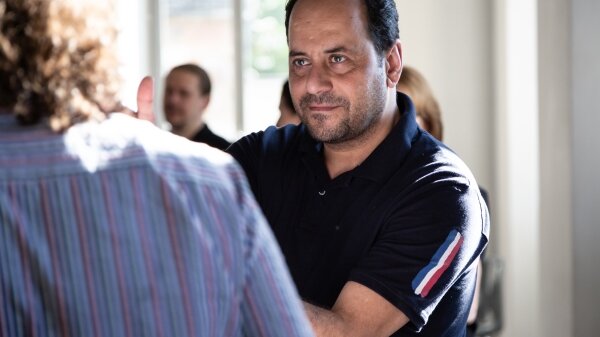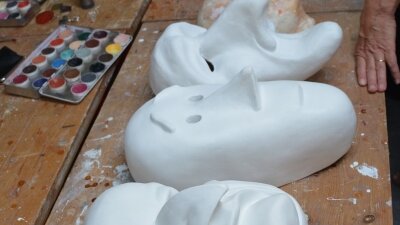AGYA Members Benefit from Tailor-made Professional Trainings
AGYA Members Benefit from Tailor-made Professional Trainings
The opportunity to request and organize tailor-made professional training opportunities is one of the many benefits of membership within the Arab-German Young Academy of Sciences and Humanities (AGYA). AGYA training opportunities aim to enhance members’ intercultural knowledge and leadership skills, boost personal capacities like communicating in different contexts, and provide members with alternative formats in which to interact and explore ideas.
From effectively integrating storytelling into science communication to exercises on body language and using performative techniques from theatre to enhance presentation skills, the capacity building opportunities offered to AGYA members are manifold: In tailor-made trainings with highly professional coaches and experts, AGYA members get the chance to enhance their academic careers with fresh interdisciplinary perspectives and further develop their intercultural and leadership skills.
Intercultural Communication Skills are Key for Academic Career Prospects in the International Scientific Community
‘As researchers, of course we need hard skills’, says AGYA member Zeina Hobaika, ‘but we also need soft skills as well’. Reflecting on the recent training session she attended on integrating ‘storytelling’ into science communication at the 2018 AGYA Annual Conference in Cairo, Hobaika underscored the importance of such capacity building opportunities offered by the Academy: ‘Through training on personal development topics like communication and how to make science more accessible to society, AGYA helps us develop the soft skills needed for full academic careers.’ Because AGYA encourages its members to proactively reach out to stakeholders and publics beyond the ‘ivory tower’ of academia, the Cairo training sought to enable scholars from different disciplines to deliver scientific messages effectively by developing accessible communication styles and techniques for staying on message, even in challenging situations. For Hobaika, ‘that’s what being an AGYA member is all about—it’s about fostering innovative collaboration between excellent scholars, but also about empowering them with the communication and leadership skills to bridge the gap between science and society’.
In several different training sessions, master coach Dominik Cziesche has led AGYA members in exploring how creative science communication techniques can help disseminate and foster a better understanding of cutting-edge research topics in society. After learning about dynamic presentation formats, including how to incorporate storytelling strategies in presenting scientific facts to the public, the participants practiced them in real-life settings, such as poster presentations, media interviews and panel discussions.
AGYA Scholars Explore Non-verbal Communication Skills
In another interactive training workshop in Switzerland, AGYA members examined body language, communication and public appearance through the lens of theatre practice, organized in the framework of an AGYA Working Group Project on ‘performance’ and the ‘performative’. Over two days, trainers Hans-Henning Wulf and Colette Roy led AGYA members in exploring themes like presence, authenticity, interaction, spontaneity and body language from different perspectives, with the aim of provoking long-term changes in patterns of thinking, sensing, feeling and interacting with others. For AGYA member Konstantin Klein, a highlight of the Switzerland workshop was how the exercises invited the participants to change their point of view and encouraged a playful approach. Since joining AGYA in 2018, Klein has taken advantage of several trainings offered by the Academy. ‘AGYA trainings are great opportunities for my personal and professional development’, he explains, ‘and for teambuilding among AGYA members.’
One component of the Switzerland workshop involved special training with character masks. Because masks’ expressions remain static, AGYA members were forced to experiment with how posture, rhythm and body dynamics effect communication, offering them the chance to reflect on and improve their public appearance and non-verbal communication skills. When practicing interview situations with and without masks, AGYA member Henda Mahmoudi noted that ‘public speaking felt entirely different when I wore the mask. I had to find new ways to explain my ideas to others, as I could not show any emotion through my face’. As a biotechnologist, Mahmoudi admitted: ‘At first, it seemed like performing with the masks had nothing to do with our scholarly fields, but at the end, I could see how non-verbal communication skills could really enhance our work, whatever the discipline’. She highlighted how important it is that AGYA offers different types of trainings, because ‘it’s easy to get stuck in your narrow field of work. These trainings encourage us to keep an open mind and experiment with different techniques from other disciplines’, she said.
High-level Trainings Advance AGYA Members’ Personal and Professional Capacities
While the training opportunities offered to AGYA members are optional, many count them as a significant benefit of their AGYA membership. Many members report integrating the lessons and skills learned through AGYA’s stimulating alternative training formats into their daily lives, leading to concrete improvements in their professional performance. ‘I definitely think more about how I communicate now and consciously use many of the techniques I’ve learned about posture and body language in my teaching and interviews. I have seen a positive impact, both in terms of my professional confidence and how I am able to convey my research to others’, concludes Mahmoudi.
